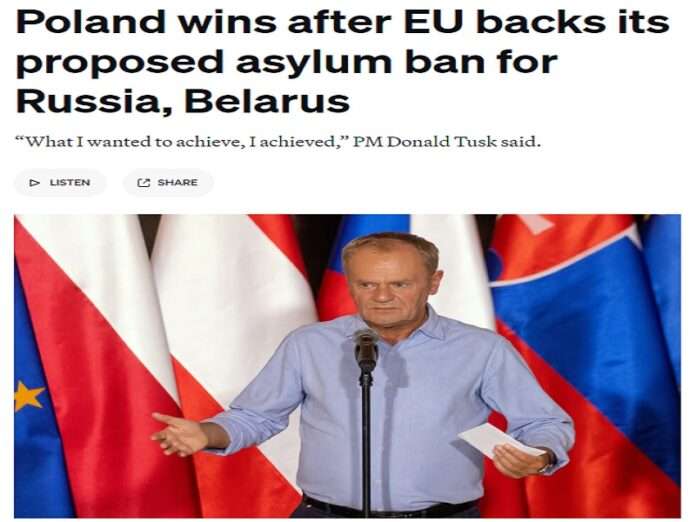Poland’s plan to suspend asylum rights for those migrants illegally crossing into the country from Belarus was criticized by the European Commission for compromising on the bloc’s values, but the European Council later approved of it as an “appropriate measure” to an “exceptional situation”. This move represents the evolution of the trend that was led by Hungary over the past decade after it built a fence along the Serbian border during the 2015 Migrant Crisis, which Poland replicated during the 2021 one.
The influx of illegal immigrant invaders posing as refugees that flooded into Poland from Belarus prompted the former to build its own fence along portions of the border. The outbreak of the Ukrainian Conflict shortly afterwards led to a lull that only began to resume in summer 2023, following which Poland and the Baltic States began to forcefully push back some invaders. Finland then built upon their policy a few months back by temporarily suspending asylum applications for some categories of people.
That new NATO member had accused Russia of weaponizing migration processes as revenge for joining NATO, echoing Poland and the Baltic States’ accusations against it and Belarus. For their part, those latter two denied that they’re doing that, though the argument can be made that they’re at the very least turning a blind eye to these processes as an asymmetrical response to NATO’s aggression against them. In any case, the existing trend has been for the EU’s eastern members to tighten their border security.
Undoubtedly, some of the means through which Poland has pursued this policy since last summer go far beyond stopping illegal immigrant invaders and are actually aimed at worsening conventional tensions with Russia, which was explained here at the time. The latest move doesn’t carry any such risks, however, and might actually de-escalate some of the aforesaid tensions by making it less likely that Polish security forces feel pressured to fire across the border in self-defense.
Some observers were worried that summer’s new law allowing them to use lethal force against illegal immigrant invaders with impunity in response to active threats could lead to an international crisis given the growing conventional tensions between Russia-Belarus and NATO along the Polish frontier. These fears will abate if less illegal immigrants attempt to invade Poland from Belarus upon the suspension of their asylum rights, which can in turn lead to both camps better managing these dangerous tensions.
Another benefit is that incumbent Prime Minister Donald Tusk’s candidate for next year’s presidential elections (whoever they’ll be) now stands a much better chance of winning after appealing to public sentiment on this issue and thus placing that branch of government under the control of his party. The current deadlock between the (very imperfect) outgoing conservative-nationalist president and the Germanophilic liberal-globalist premier impeded the further imposition of German will over Poland.
Poland has largely subordinated itself to Germany over the past year since Tusk returned to power as explained here, but there’s always more that it could do, which might come to pass if the liberal-globalists win the presidency after appealing to conservative-nationalist sentiment on this issue. It therefore can’t be ruled out that they’re just pretending to be hardliners on this issue and Germany is playing along in order to help their allied party obtain control over that branch of government next year.








